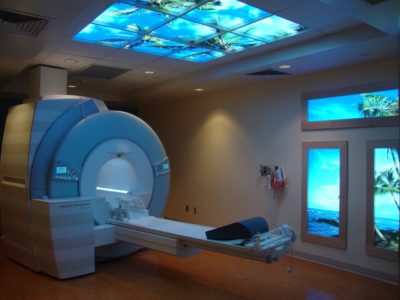 Magnetic Resonance Imaging
Magnetic Resonance Imaging
Magnetic Resonance (MR) does not use radiation to produce images of the body. It passes radio waves through a powerful magnetic to generate images. The various body structures produce differing frequencies of radio waves, and these are picked up and converted into digital images by a computer. MR can image virtually any part of the body but it is especially good for imaging soft tissues such as the brain, spine and joints, as well as the venous and arterial systems.
Some of our MRI studies include, but are not limited to:
1. MRI urogram
2. MRI enterography for IBD, Crohn’s disease, and ulcerative colitis,
3. MRI brachial plexus for nerve roots
4. MRA aorta/mesenteric
PATIENT EXPECTATION
For all MRI examinations, patients routinely change into a procedure gown and are laying on a table. Prior to starting the procedure, the technical staff will place a device called a “coil” over the body part to be examined. The coil is a device that sends and receives the radio frequency waves during the examination. As the procedure starts, the table will move into the magnet. During the procedure, the table may move and you will hear a variety of noises ranging from a humming to a loud knocking sound. These are all normal sounds and you will be provided with earplugs and headphones to diminish the effect of the noise. The particular examination you are having may require the injection of contrast material through a vein in your arm and the technical staff will explain that process to you.
During the procedure it is important that you hold very still in order to obtain the best possible images. MR procedure time can range between 30 – 60 minutes. The technical staff will be able to communicate with you during the procedure via a microphone in the control room. You will also be provided with a push button hand held communication device in the event you need assistance from the technical staff. The technical staff will explain the use of that device with you prior to starting the procedure.
PATIENT PREPARATION
Most MR examinations do not have specific dietary restrictions or other physical preparations. When your procedure is scheduled, however, our staff will review with you all preparation information that may apply. Due to the strong magnetic field, there is a detailed screening protocol to make sure there are no metal objects (loose or implanted within your body) that may pose a safety hazard to you, our staff or to our equipment. The technical staff will review this process with you in detail prior to entering the MR procedure room.
Some patients may require a mild anxiety-relieving medication to assist with the anxious feeling or claustrophobia. Your physician can prescribe this for you.
PROCEDURE SIDE EFFECTS / COMPLICATIONS
Magnetic Resonance (MR) does not cause any known side effects. It is important to notify the staff if a patient is pregnant. Although there are no known effects on the fetus, the scan may be modified or scheduled later in the pregnancy.
Some patients may experience a ringing in the ears following the procedure but this is temporary and should pass quickly. The earplugs and headphones used during the procedure should minimize the ringing in the ears.
FOLLOW-UP CARE
Please follow up with your primary care physician for results.
